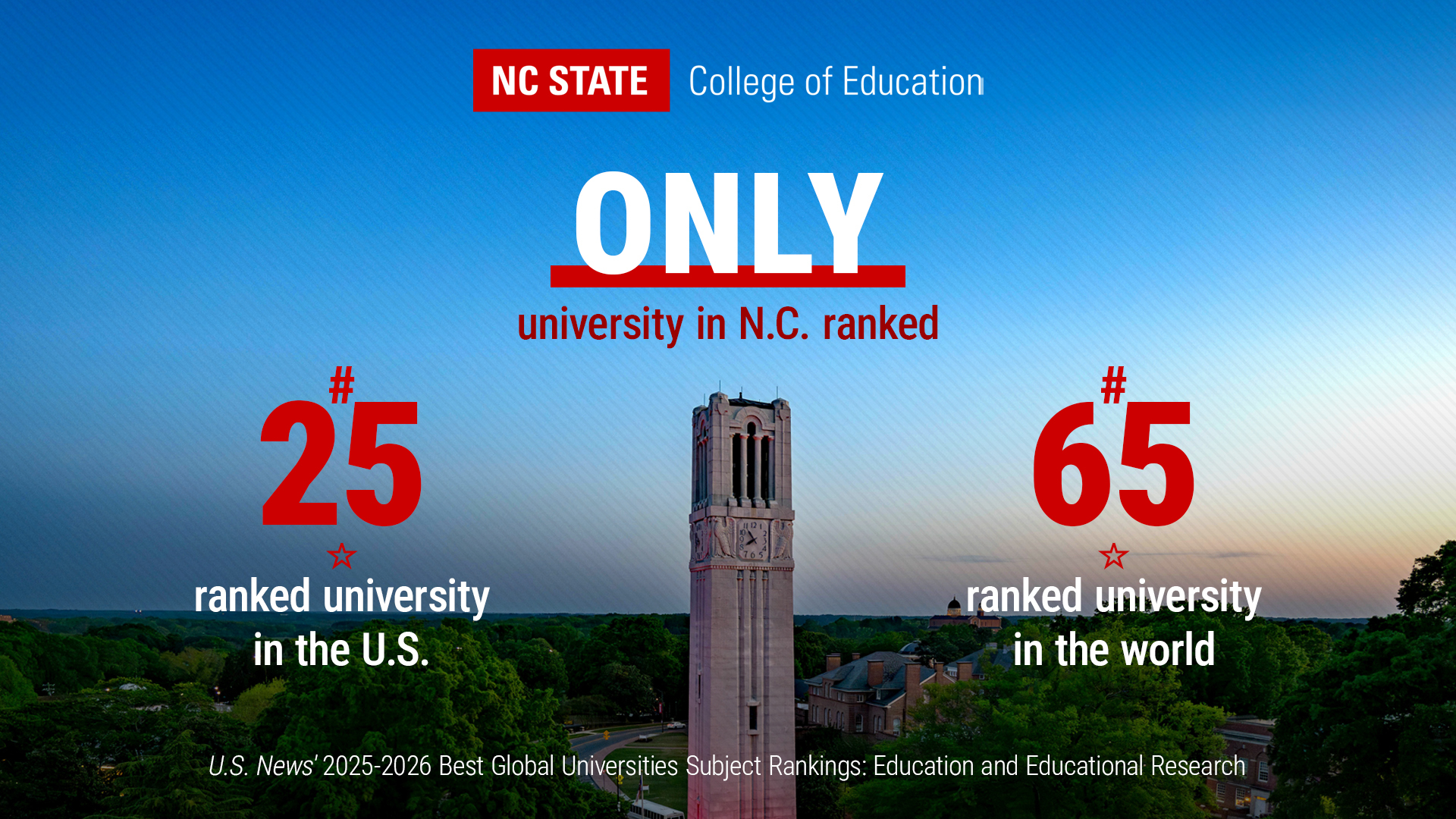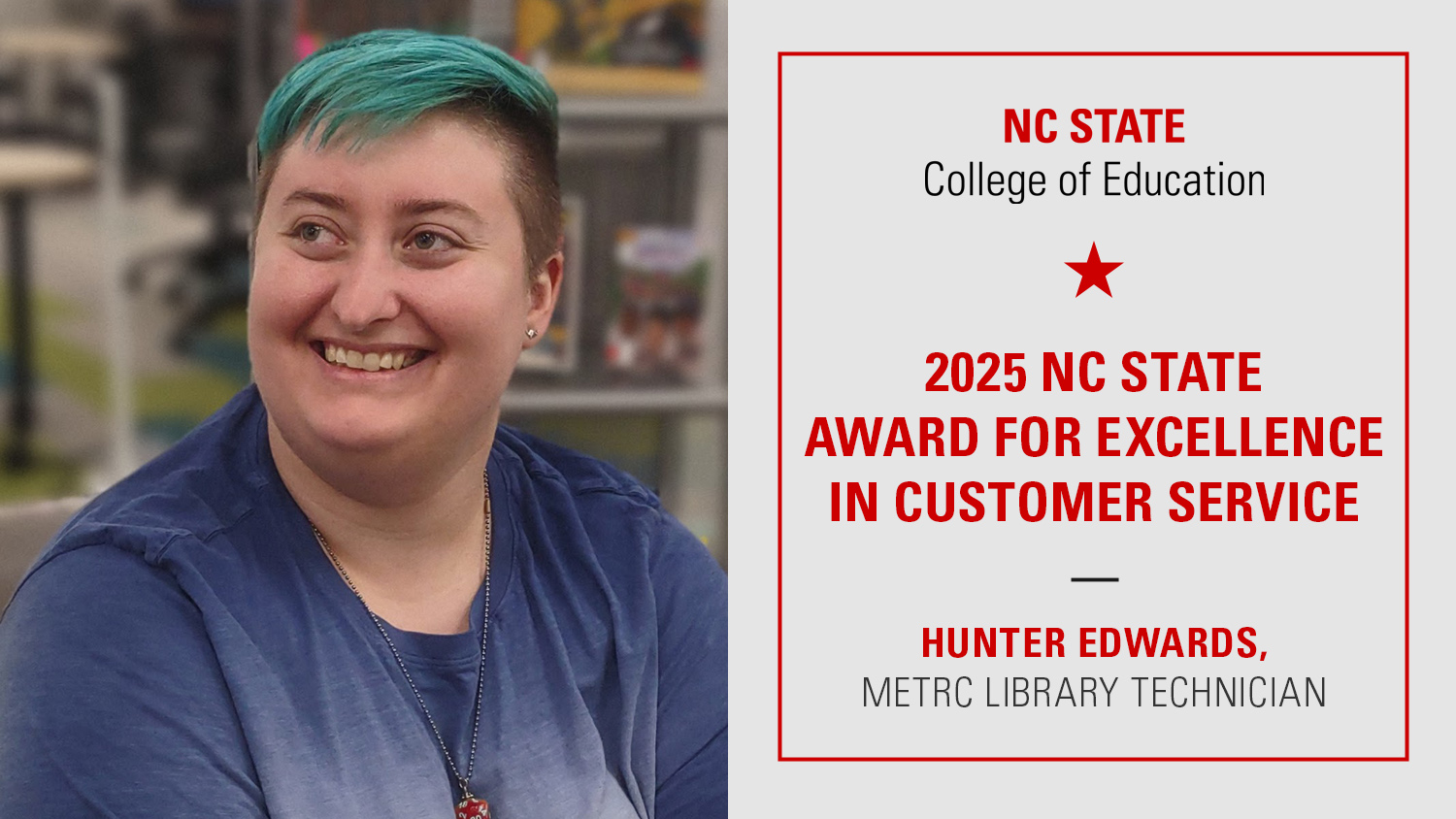My Student Experience: We Teach for NC Spring Break Trip Opens Window Into Education in Eastern North Carolina

Before they left for eastern North Carolina, a group of College of Education students completed a data dive on the three counties — Edgecombe, Lenoir and Wayne — they would soon visit as part of We Teach for NC Spring Break.
Jenna Jones, a junior mathematics education major and Teaching Fellow, was not surprised to see the three Tier 1 counties faced challenges in regards to education.
“I was just thinking to myself, this reminds me of my own school system’s report cards,” said Jones.
But Jones, who grew up in the eastern North Carolina town of Bayboro, was also reminded of the supportive educators who inspired her to become a teacher—teachers whose names would not make an appearance in a data dive.
Data, says NC State Teaching Fellows Director Crystal Espey, tells just one part of the story.
Along with Transformational Scholarships Program Director Trisha Mackey and Director of Outreach and Strategic Partnerships Lindsey Hubbard, Espey planned this year’s We Teach for NC Spring Break with the purpose of filling in the rest.
“Our goal of the trip is to show that education is valued and there are fantastic things happening in those counties, even though the data may not reflect that,” Espey said.
On the We Teach for NC Spring Break, which was funded by a university grant written by Associate Dean for Student Success Anona Smith-Williams, students participate in a three-day cultural immersion trip that engages them in high-poverty, low-performing schools in rural areas of North Carolina.
“What’s really great is going into the schools, getting to interact with students and really learning about the innovative and cutting edge things that these rural districts are doing to support their students and people in their districts,” Mackey said.
Edgecombe County
The first stop on the We Teach for NC Spring Break was Edgecombe County. After being welcomed to Princeville Elementary School by Valerie Bridges ‘02MSA, ‘10EDD, the 2022 A. Craig Phillips N.C. Superintendent of the Year, they continued on to the county seat of Tarboro, where Diego Alonso-Galindo, a junior science education major, grew up.
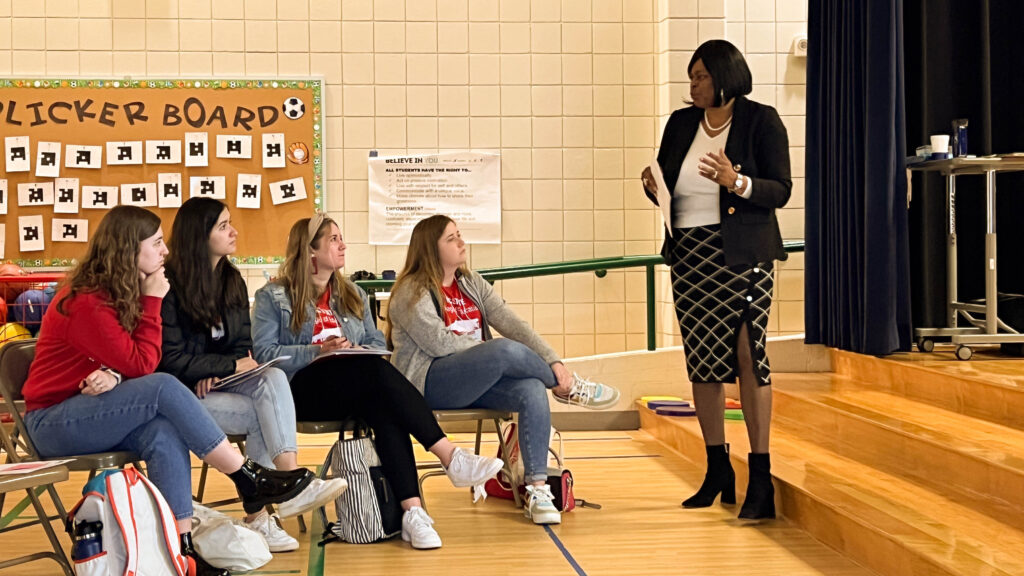
“I was able to tell people, ‘This is my hometown,’ Alonso-Galindo said. “I know the vibe here. So it was just pretty nice. I’m getting to connect with my roots and share that with everybody else.”
Alonso-Galindo knows firsthand the benefits of attending school in Edgecombe County. He discovered his love for education through Edgecombe Early College High School’s Scholar Teacher program, which prepares high school students who are interested in teaching and provides them with a scholarship on the condition that they return to the county to teach.
“It’s a great opportunity for me to be able to give back to my roots,” Alonso-Galindo said.
In Edgecombe Early College High School, Alonso-Galindo and his fellow students were able to speak with 2019 North Carolina Principal of the Year Matthew Bristow-Smith ’14MSA and learn what Edgecombe County has to offer its teachers.
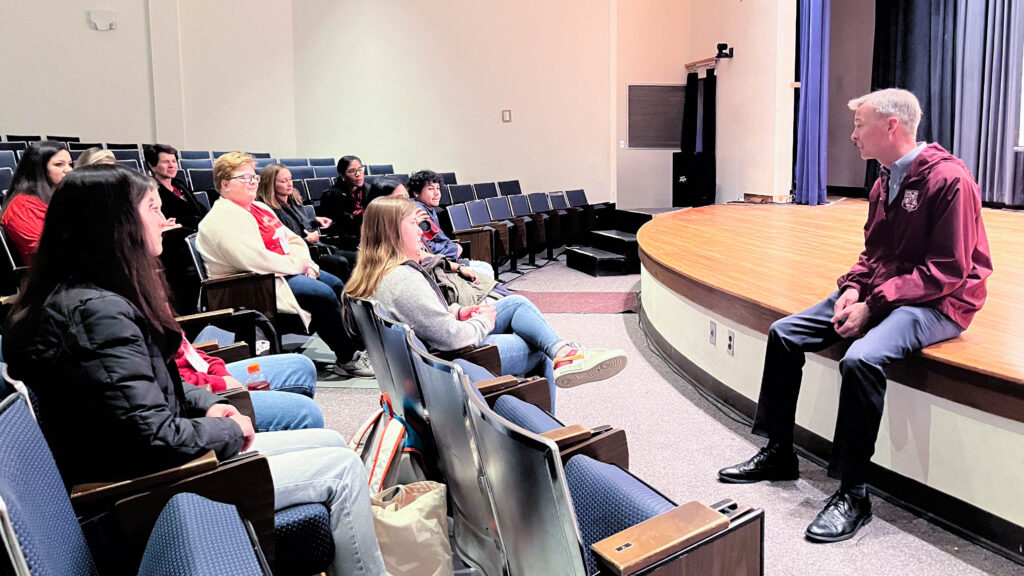
“Seeing the different resources that Egecombe was able to provide to their teachers in regards to beginning teacher support and mentorships, I think it was really cool,” Alonso-Galindo said.
At the school, Jones, the mathematics education major and Teaching Fellow, appreciated the opportunity to conduct empathy interviews, where she sat down with a student and talked about school, as well as their interests.
“This is the career I want,” Jones said. “I want to be able to interact and get to know them.”
Before leaving, Alonso-Galindo and Maria Mata-Reyes, a science education major and a fellow Scholar Teacher, spotted Scholar Teacher Director Leigh Ann Webb about to leave for the day and ran up to say hello.
“It felt like a full circle moment,” Alonso-Galindo said. “I wasn’t looking at it through the lens of a student. I was looking at it as a prospective teacher that’s going to be coming back to this area.”
Lenoir County
In Lenoir County, the students toured Woodington Middle School, Northwest Elementary and Northeast Elementary, where they met Principal Rashard Curmon ’17MSA.
Listening to Curmon, Alonso-Galindo said he was impressed with how Curmon prioritized inclusivity and gave students options in their own education.
“He is able to ask for student feedback in regards to what kind of programs or extracurriculars they want to see,” Alonso-Galindo said. “I think that’s a great way for students to start exploring different interests and hobbies.”

At the next stop, Kinston High School, the students visited Lancer Academy, a partnership between Lenoir County Public Schools and Lenoir Community College designed to increase high school students’ access to college-level classes, particularly those that lead to careers in health care.
“They were very focused on making sure that no matter what you wanted to do, you were prepared to do it, which I loved hearing about,” Jones said.
Then, they ate lunch over at Lenoir County Public Schools Central Services, where they were able to learn more about the county’s plans to support incoming teachers through their beginning teaching program..
“Everyone who spoke was very passionate about their beginning teachers and about supporting teachers beyond that point,” Jones said.
Jones also appreciated the opportunity to ask current teachers about their experiences.
“We were just able to mingle and be real about things,” Jones said.
The trip was not only about visiting schools and talking to educators. Espey, Mackey and Hubbard also wanted to ensure students had opportunities to enjoy their time in eastern North Carolina. In Kinston, they stayed in the Mother Earth Motor Lodge, which Alonso-Galino compared to the Cozy Cone Motel from the movie “Cars,” and the students also had a chance to go ax throwing, even competing against one of the employees.
“The worker was like, ‘If one of y’all can beat me in a match, it’s free.’” said Alonso-Galindo. “We didn’t beat him. But it was fun.”
Wayne County
Throughout the trip, a highlight for Jones was getting to explore classrooms in eastern North Carolina and talk with students. At Charles B. Aycock High School in Wayne County, she had the opportunity to step into a math class and imagine her future as a teacher.
“Seeing a classroom doing logarithms and having natural logs, it was like, ‘Oh, this is my element,'” Jones said.
For Alonso-Galindo, just touring a high school that was so much larger than where he went to school was an eye-opening experience.
“It just gave me a different perspective,” Alonso-Galindo said. “It opened up my eyes to see that everybody takes different paths. Everybody has different experiences. And those experiences are what got us to this point here. So, it was just really neat to see that.”
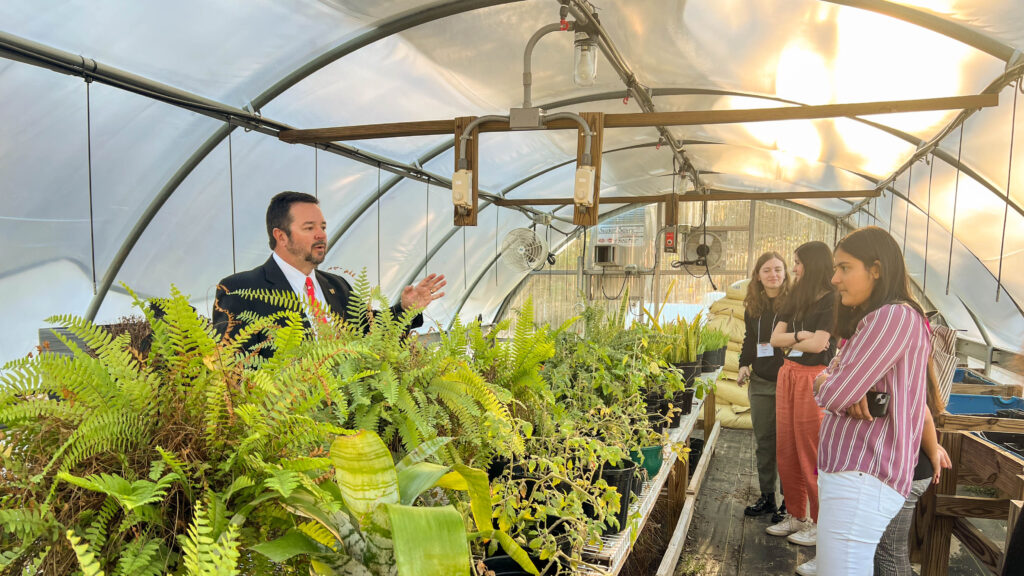
Their visit to Wayne County also provided an opportunity to interact with yet another NC State alum, this time David Wilson ’91, the superintendent for Wayne County Schools. Espey said connecting College of Education students with alumni was a way to show them the possibilities that are available.
“It’s Wolfpack pride,” Espeys said. “We’re proud to be a part of the Wolfpack and we’re proud our college expands out beyond just Wake County. For our students, I think it’s really about them being able to see your trajectory and your pathway or in your career.”
The We Teach for NC trip not only provided students with a window into education in eastern North Carolina. It also acted as a source of inspiration.
“It makes you remember why you’re in the program and why you want to be a teacher,” Jones said. “You get to see these classrooms. You get to meet with these kids and staff. And not only that, but you’re surrounded by people who want the same thing as you. They want to be in a classroom and they have the same ideals.”
Espey hopes the trip showed students that there are educators who are making a difference in eastern North Carolina and that they can, too.
“We want to prepare them to be the best teachers and empower them to know that they can go anywhere across the state, and that all school districts are really working to support their students,” Espey said.
Both Alonso-Galindo, who will teach in Edgecombe County, and Jones, who also plans to return to eastern North Carolina to teach, said they are now excited about what the region has to offer.
“I’d love to go back east,” Jones said.
- Categories:

